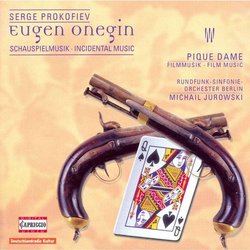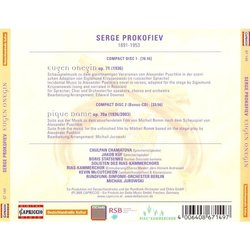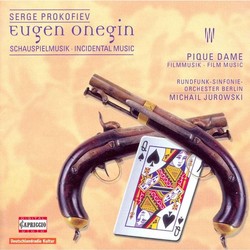Eugen Onegin / Pique Dame
Incidental Music - Film Music
Stay better informed and get access to collectors info!
| # | Track | Duration | |
|---|---|---|---|
| Eugene Onegin, incidental music Op. 71 (1936 orch. 1973) | |||
| 1. | Scene One: Lensky at Larin's grave | ||
| 2. | Scene Two: Onegin and Lensky at Lensky's country house | ||
| 3. | Scene Three: At the sister's home | ||
| 4. | Scene Four: Having taken a short cut, they're on their way home as fast as possible (not included as unscored) | ||
| 5. | Scene Five: Tatyana in the park (not included as unscored) | ||
| 6. | Scene Six: Tatyana and Nurse (not included as unscored) | ||
| 7. | Scene Seven: Tatyans's letter | ||
| 8. | Scene Eight: Onegin receives Tatyana's letter | ||
| 9. | Scene Nine: Onegin scolds Tatyana in Larin's garden (not included as unscored) | ||
| 10. | Scene Ten: Lensky and Onegin together in Lensky's house | ||
| 11. | Scene Eleven: Tatyana's dream | ||
| 12. | Scene Twelve: Larin's ball | ||
| 13. | Scene Thirteen: Duel | ||
| 14. | Scene Fourteen: Tatyana visits Onegin's house | ||
| 15. | Scene Fifteen: Waltz-Tatyana meets Onegin in St. Petersburg | ||
| 16. | Scene Sixteen: Onegin's letter to Tatyana-Closing Chorus of the students |
| # | Track | Duration | |
|---|---|---|---|
| Pique Dame, incidental music for the unrealised film Op. 70 (1936) | |||
| 1. | Overture | ||
| 2. | Wandering About | ||
| 3. | Hermann in Front of the Countess's House | ||
| 4. | Liza | ||
| 5. | Hermann at Home | ||
| 6. | Morning | ||
| 7. | Hermann Spots Liza | ||
| 8. | Hermann Delivers a Letter to Liza | ||
| 9. | Liza Reads the Letter | ||
| 10. | Liza Daydreams and Writes an Answer | ||
| 11. | Liza Goes out with a Letter to Herman | ||
| 12. | Hermann Reads the Letter; Hermann in front of the Countess's House | ||
| 13. | Hermann in Liza's Room | ||
| 14. | The Ball | ||
| 15. | Liza in her Room | ||
| 16. | Hermann with Playing Cards | ||
| 17. | Visiting the Countess | ||
| 18. | Hermann Takes Notes, Puts them into his Pocket, Enters the Gambling Parlour | ||
| 19. | First Winnings | ||
| 20. | Hermann enters the Gambling Parlour for the Second Time | ||
| 21. | Second Winnings | ||
| 22. | Hermann enters the Gambling Parlour for the Third Time | ||
| 23. | Hermann has Lost | ||
| 24. | Last Rendezvous. |
Eugen Onegin / Pique Dame
Added on Thursday, April 25, 2019
Prokofiev's score for the Alexander Tairov production of Pushkin's play Eugen Onegin was never used (or orchestrated by the composer) because the play itself, thanks to Stalin's censors, was never staged. The resourceful Prokofiev reused the work's many gorgeous themes in a spate of famous works, including the operas War and Peace and Betrothal in a Monastery, the Eighth Piano Sonata, the ballet Cinderella, and Symphony No. 7.
Lasting here over 76 minutes and having 46 numbers, the work, orchestrated by Russian composer G. Zinger in accordance with notes left by Prokofiev, opens with a haunting lyrical melody that frequently reappears. Another striking theme, which appears in the first scene of War and Peace, is soon presented. In fact, there follows a parade of famous Prokofiev themes that many listeners will instantly recognize. Their context is often different: one of the famous waltzes from War and Peace, for example, shows up here in a deliciously dark and tart version for harpsichord!
As for the performance, the vocal soloists and chorus are splendid throughout: could the listener ever imagine greater spirit and color than what is heard in No. 26, the lively last number to the Ball scene? And the orchestra, under the direction of Prokofiev specialist Michail Jurowski, is convincing, too. The winds are especially attuned to the generally serene and darker character of the music: the oboist and bassoonist, in separate solos, float the lovely opening theme with a mesmerizing beauty. The added Russian narration does not enhance the work, but it isn't lengthy and not a major distraction. Downes (Chandos) and Ponkin (Harmonia Mundi) have recorded Onegin effectively, but this Jurowski version is clearly preferable: Downes is padded out with even more narration and dramatics and Ponkin is missing three numbers.
Pique Dame was written for a film project that was also canceled for political reasons. It, too, features themes Prokofiev later reused: the work's dominant melody is the main theme to the third movement of Prokofiev's Fifth Symphony. But the work is of less interest than Onegin. Why? The music is extremely repetitive throughout its 34-minute length -- some sections return unchanged again and again. Still, the music has its moments, from the dark and agitated opening to several mesmerizing appearances of the Fifth Symphony theme. Again, the performances are committed and the sound in both works here is detailed and powerful.





